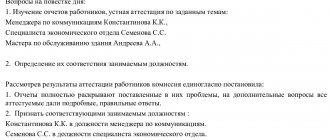Certification is an important part of the enterprise's working system. Without this procedure, it is difficult to imagine competent personnel management, because the qualifications of employees grow unevenly, which means that some employees may no longer meet the requirements for their positions. The certification procedure is aimed at identifying “weak links”, whose fate is decided by the company’s management on an individual basis.
If the employer is interested in continuing cooperation, then he sends the specialist to advanced training courses, trainings, retraining or other professional development programs, otherwise he terminates the employment contract with the employee.
Why do employee certifications take place?
Initially, regular certification was conceived as a tool to help identify employees who, for whatever reason, are not suitable for their positions. However, in conditions of economic regression, some enterprises assemble certification commissions not to stimulate staff, but only in order to have legal grounds for dismissing unwanted employees. In the same way, a specialist whose position has been laid off can be removed.
However, according to Article 76 of the Labor Code of the Russian Federation, failure to pass certification is not a direct reason for dismissal. In this case, labor legislation allows the management of the enterprise only to suspend the employee from work until re-examination.
But since not all staff know their rights, the employer often acts more cunningly: those who do not pass the certification are offered to “disperse peacefully” by writing a statement of their own free will. Another option is intimidation with layoffs, with the firm understanding that in reality it is impossible to fire an employee because of a failed exam.
Can they fire me if the results are negative?
The Labor Code of the Russian Federation contains precise conditions that employees themselves must meet certain requirements. This is confirmed by the provisions of Article 81. It also states that, based on the results of certification, dismissal initiated by the manager is possible if the employee has not passed the certification.
The main thing is to carefully consider everything related to the preparation of the results of such checks.
What is included in the concept of employee certification?
The procedure for conducting certifications is necessarily prescribed in the local acts of the organization, and is also agreed upon with employees at a general meeting or through representatives of the trade union. If an enterprise wants to formalize a certification provision, the entire company staff must be familiar with the documents against signature.
In addition, the employer is obliged to ensure a technically correct knowledge testing procedure:
- The assessment of an employee’s competence occurs only with his consent (the recommended period in which the employer must notify the employee about the upcoming certification is one year);
- In the presence of the commission;
- Orally/written;
- Using a specially prepared certification sheet;
- With the obligatory preparation of minutes of the meeting.
The peculiarities of employee certification include the fact that the employee must familiarize himself with the certification sheet, which he signs after passing the exam. If the procedure was carried out in accordance with the above rules, then it is considered legal.
As for the certification results, they are regulated by the regulations adopted at the enterprise and may include not only a mark of compliance/non-compliance with the position held, but also recommendations for advanced training or professional retraining. In the future, members of the commission have the right to check whether the employee complied with the instructions.
Goals and form of certification
At most enterprises, certification exams are held annually, which is a gross violation of the law. According to Article 81 of the Labor Code of the Russian Federation, certification of employees can be carried out only once every 3 years. The only exception is the situation in which testing periods are reflected in local regulations.
The procedure is carried out for the following purposes:
- checking the skills and competence of each employee of the enterprise;
- determining the level of professional training;
- checking the compliance of the employee’s level of training with the position held;
- conducting analysis and identifying potentially promising employees.
The employer has the right to independently choose the form of certification or entrust this work to a specially created commission. In most cases, all enterprises use one of three types of testing. These include:
- Interview with the immediate manager or owner of the company. This form of certification differs from others in that it can be carried out by the general manager. He calls each employee in turn and talks with him, asking questions on professional topics. If the manager does not want or cannot carry out such a check, then he has the right to entrust this work to the heads of each department.
- Collegial interview. To carry out such certification, a special commission is created, consisting of professionally trained people and the management team of the company. By a predetermined day, the employee writes a report on the work done for a certain period, in which he indicates all the achievements and shortcomings. After submitting the report to the commission, the employee answers all questions of interest.
- Testing or examination in written form. On a specially designated day, all employees of the enterprise are given tickets. They contain questions or tests that require written answers. After completion of the certification, a check is carried out and an appropriate assessment is given.
Order of conduct
Dismissal of an employee who has not passed certification can only be legal if the employer has complied with all the requirements of labor legislation. Otherwise, the termination of the employment contract may be declared invalid.
Stages of the procedure:
- At the very beginning, an internal regulatory act is created, which specifies not only the goals of the certification, but also the timing, evaluation criteria, and the composition of the receiving committee.
- The document is brought to the attention of all employees against signature.
- An attestation commission is created, which must include at least seven people (chairman and his deputy, secretary, trade union representative, at least three examiners). The list of persons who will be responsible for testing is approved by the owner of the enterprise and recorded in the order.
- Preparatory work is carried out (forms for evaluating company employees are printed, reports and conclusions are drawn up).
- On the appointed day, certification is carried out.
- The results of the event are summed up. All representatives of the commission draw up a conclusion in which they indicate the degree to which the employee’s knowledge corresponds to the position held and recommend that the manager make this or that decision.
- The certification results are sent to the director of the enterprise or its owner.
Is certification a mandatory procedure?
Legislative acts do not force all employers, without exception, to regularly re-examine their employees. The Labor Code of the Russian Federation does not stipulate that any enterprise is obliged to periodically check the professional suitability of its employees.
However, personnel in some industries must undergo mandatory certification. This includes:
- Workers in the railway, shipping and aviation sectors;
- Personnel employed at hazardous production facilities and in organizations involved in the storage or disposal of chemical weapons;
- Employees ensuring the functionality of space infrastructure;
- Staff of libraries and educational institutions;
- State civil servants of the Russian Federation;
- Persons heading federal unitary enterprises;
- Some other categories of workers noted in legislative acts (rescuers, nurses and doctors, auditors, prosecutors, dispatchers of city/suburban/intercity/international transport, etc.).
In other cases, the decision to conduct certification remains with the company’s management.
Common Mistakes
Mistake #1. Certification documents can be prepared retroactively.
No, this cannot be done: some employees may refuse to sign them, and in court proceedings it will be possible to prove this violation on the part of the employer.
Mistake #2. It is not necessary for a trade union to participate in dismissal if the employee is a member of one.
If there is a trade union at the enterprise, any procedures regarding changes in the status of workers must be carried out with the participation of its representatives.
Who conducts employee certification?
To assess the competence of employees, a certification commission is assembled, which consists of members appointed by the management of the organization. If dismissals are planned based on the results of the audit, a trade union representative must be included in the commission. At the same time, staff should be aware of the upcoming exam.
Categories of employees not subject to certification:
- Pregnant women;
- Women who are on maternity leave or who left it less than a year ago;
- Unmarried women in whose care there is a disabled minor child;
- Specialists who have not worked at the enterprise for one calendar year.
By decision of the employer, employees with fixed-term employment contracts, young employees, trainees, fathers/mothers of many children and people who received a diploma of professional retraining or advanced training less than a year ago may also be exempt from certification.
Exceptional situations
The Labor Code of the Russian Federation provides for various situations that can happen in real life. All of them are described in detail and must be taken into account before attempting to fire an employee. If you neglect them, you may face the need to conduct litigation, which will entail large financial and time costs.
Prohibition on breaking an employment contract
For certain categories of employees, there are rules under which dismissal based on the results of certification is not allowed.
This is due to the lack of legal grounds for the head of the enterprise to terminate the employment contract with some employees. Consequently, for them the testing process itself becomes meaningless. These employees include:
- pregnant women (only if all necessary documents and medical certificates are provided);
- employees who are on maternity leave and have children under 3 years of age;
- a single mother raising a minor child with a disability;
- an employee who has a disabled child and is the sole breadwinner;
- an employee raising three or more children (only for persons who are considered the sole breadwinner in the family);
- employees on vacation;
- employees who are temporarily unable to work.
In certain situations, dismissal can only be carried out taking into account the rules provided by law that are specific to a particular case. Otherwise, the termination of the employment contract can be appealed in court.
The following employees fall under this rule:
- trade union members;
- minors;
- representatives from the workforce participating in various negotiations with management;
- employees of the enterprise participating in the resolution of labor disputes;
- workers who participated in strikes;
- heads of collegial bodies and their deputies.
Refusal of testing
The Labor Code of Russia does not provide for the mandatory dismissal of an employee who has not passed certification or refused it. If such a situation arises, the employer has the right to apply one of the disciplinary sanctions. These include the following:
- Comment. The owner of the business can apply this type of penalty orally or in writing. This is done only in cases where the manager considers the refusal to undergo certification to be a minor violation.
- Rebuke. A more serious punishment may be a reprimand. It is documented and applied in case of serious violations of labor discipline.
- Dismissal. This penalty can be applied only after the relevant order is issued (at the initiative of the manager or employee).
All types of penalties can be applied only if the employee has read the certification report and signed it. Otherwise, disciplinary action may be classified as illegal.
Trial
A dismissed employee who has failed the certification can defend his position only if the employer violated the requirements of the law. To do this, you need to prove one or more facts. Among them may be the following:
- lack of actual certification;
- there was no familiarization with the regulatory act, which contains all the information about testing the level of knowledge;
- the employee was absent during the certification for a valid reason;
- the employee did not sign the certification protocol;
- the commission did not reveal any inconsistency with the position held, and the decision to dismiss was made by the head of the enterprise;
- the employee was not offered a single vacancy in which he could continue his career;
- inability to assess working conditions for all proposed vacancies;
- during certification, knowledge was tested that was not necessary (does not correspond to the work the employee performs);
- Among all the employees of the unit, only some people were tested;
- the employee did not have enough time to prepare for the certification.
If one of the listed facts has been proven, then the employee can count not only on reinstatement, but also on additional privileges. Their presence is determined based on a court decision. These include:
- payments for forced absences (from the date of signing the order until reinstatement);
- payments for the delay (if the employer deliberately delayed the legal process);
- compensation for moral damage.
Dismissing an employee based on certification results is a rather complex undertaking that requires the company owner to strictly comply with the law. If everything is done correctly, you can fire an unqualified employee and avoid lengthy litigation.
Dismissal based on certification results: how to challenge?
The main goals of conducting examinations at an enterprise are most often identified as:
- Improving personnel management methods;
- Improving the quality of personnel work;
- Increasing the overall professional level of personnel.
However, sometimes as a result of a knowledge test, incompetence of employees is revealed, which the employer is not ready to put up with. In this case, he cannot simply fire the person, since, according to the Labor Code of the Russian Federation, the employer is obliged to offer the employee a position corresponding to his qualification level. The company management must notify the employee of the decision in writing.
In addition, any decision of the certification commission can be challenged, especially if the procedure was not carried out in strict accordance with regulatory acts (the specialist was not notified of the knowledge test within the prescribed period, he did not sign the certification sheet, the employer announced the layoff verbally, etc. ).
Is it possible to fire an employee if he refuses certification?
According to the Labor Code of the Russian Federation and judicial practice, refusal to undergo certification is not grounds for dismissal, unlike failure to pass the exam . In most cases, the courts side with the employees and oblige managers to restore them to their previous positions.
Employers, if subordinates refuse certification, can impose disciplinary sanctions on them under Art. 192 Labor Code of the Russian Federation:
| Type of recovery | When and in what form is it used? |
| Comment | Oral or written form, relevant for minor violations of labor discipline |
| Rebuke | Issued in writing. Applicable for single serious or systematic minor offenses |
| Dismissal | Performed after the issuance of an order at the request of the employee or the initiative of the employer, if the subordinate committed a one-time gross violation |
What payments are due to those dismissed due to unsatisfactory certification results?
The only obligation that the enterprise has to such employees is the transfer of wages for the period of time worked. If the dismissed person does not take the required vacation, he is entitled to compensation. Additional payments upon dismissal for this reason are not provided.
How to challenge dismissal based on certification results?
Since labor legislation does not give the employer the right to directly dismiss a specialist based on the results of certification, employees laid off in this way can appeal to the district court, prosecutor’s office or federal inspectorate. A statement of claim is filed no later than a month after official familiarization with the protocol and receipt of the work book.
To challenge dismissal in court, a former employee of the enterprise must provide:
- A copy of the employment contract;
- Salary information;
- Attestation sheet;
- Commission findings;
- Extract from the work book about hiring and layoff.
The claim should be formulated, clearly indicating your demands: reinstatement or monetary compensation. It is recommended to choose the second option, since an offended employer will always find a reason to fire an unwanted specialist.
As practice shows, 90% of litigation on the issue of dismissal after certification ends in victory for the employee. The employer pays not only compensation, but also the legal costs of the laid-off employee. The amount is calculated based on the time that the former employee spent without work plus a remuneration amounting to 1/300 of the Central Bank refinancing rate for each day of delay.
Dismissal procedure
Dismissal based on certification results occurs only in the most extreme cases. As a rule, upon receiving an unsatisfactory assessment, the manager offers the employee to transfer to a position that corresponds to his level of qualifications and experience. If the employee agrees to such a demotion, then the certification ends only with personnel changes.
Otherwise, the employer can legally dismiss the employee.
In order to avoid any problems, the employer must correctly carry out the dismissal procedure based on the results of the certification. In judicial practice, there are quite often situations where an employee appeals a manager’s decision and wins the case. To avoid this, it is necessary to strictly follow all stages of dismissal provided for by law:
- The manager is provided with a conclusion from the certification commission, which indicates the test result of all employees.
- He gets acquainted with the contents of the document and decides to terminate the employment contract with one or more unskilled workers. It is important to complete this stage within the stipulated time frame. If this is not done, then all further actions of the manager will be illegal.
- The owner of the company draws up a written notice in which the employee who failed the certification is invited to fill vacant positions that correspond to his level of knowledge.
- The employee in whose name the document was drawn up familiarizes himself with its contents and signs his agreement or disagreement with the proposal.
- If the answer is positive, a personnel reshuffle is carried out; if the answer is negative, a special act is drawn up indicating a refusal to take the proposed position.
- Based on this document, the process of terminating the employment contract is initiated and a dismissal order is prepared.
- It is brought to the attention of the employee against signature. If the dismissed employee refuses to sign the document, then a special act is drawn up, which is certified by its author, as well as by two or more witnesses.
- On the last working day, a work book is filled out and given to the dismissed employee. In addition, he is provided with a package of necessary documents, and a full calculation of wages and provided compensation is made.
In some cases, an employee who fails the certification may be sent to training or advanced training courses. This is done only when the employer sees the potential of the employee, but he does not yet have the necessary experience and knowledge.
The owner of the enterprise independently makes the decision to dismiss and is not obliged to terminate the employment contract with an employee who has not passed the certification.
What to include in the certification program
The certification program should include questions that are directly related to the employee’s job description, the requirements for his education and qualifications, established professional standards, as well as internal company documents that he is required to know.
Important
You shouldn't, for example, ask a payroll accountant about tax litigation practice. The employee himself, as well as the inspectors and the court based on his complaint, may consider such questions to be incorrect, and quite rightly so.
You can invite the employee to answer more complex questions that go beyond the scope of his position, but only if the employee is applying for a promotion based on the results of certification and himself expresses such a desire.
How to fire an employee based on certification results
Read more…
In addition to answering questions, the professional successes or failures of the person being certified should also be assessed, reflecting this with an additional point. You can estimate the number of attracted clients, concluded contracts, inspected objects, held events, etc. A reduction point can be set for the presence of disciplinary sanctions for a certain period.
Who is subject to certification and who conducts it?
Certification, depending on the area of activity of the organization, can be mandatory, legally established, or can be carried out on the initiative of the administration and employees.
the results of employee certification for compliance with the position held summed up and documented ?
Mandatory certification is regulated by an extensive package of regulatory and legislative acts of federal and industry significance: Labor Code of the Russian Federation, Art. 332, 336.1 (regulates issues of mandatory certification of scientific and teaching workers), Federal Law-16 dated 9/02/07 “On Transport Security”, Federal Law-79 dated 27/07/04 “On State Civil Service”, Letter Ministry of Culture 7790-44/04-ПХ dated 08/02/10 and a number of others.
Question: Is it possible, as part of dismissal due to incompatibility with the position held, of an employee with whom a permanent contract has been concluded, to be transferred with his consent to a seasonal vacancy by concluding a fixed-term employment contract? View answer
Thus, the following categories of workers undergo mandatory certification:
- civil government employees;
- health workers;
- teachers;
- workers in the field of science;
- prosecutors;
- firefighters;
- rescuers;
- transport workers (pilots, railway workers, persons ensuring transport safety);
- heads of unitary enterprises of federal significance;
- specialists in the field of industrial safety;
- related to the movement and securing of cargo;
- cultural workers;
- other categories of workers, in accordance with federal and industry standards.
For commercial organizations and individual entrepreneurs, certification is not required, but can be specified in the LNA and used to determine the qualification level of employees.
Question: An employee, upon dismissal for inadequacy of her position, did not report her pregnancy. Is the employer obligated to reinstate her? If so, what to do with unsatisfactory certification results? View answer
The non-obligatory criterion applies only if the company is not associated with activities for which certification is mandatory. For example, if an entrepreneur carries out activities related to securing and moving cargo or an organization carries out auxiliary work in the field of railway transportation, their employees must undergo certification.
When developing LNA and carrying out the procedure, it is recommended to be guided by the following documents:
- Resolution No. 470-267 dated 5/10/73 (a joint document of the State Committee for Science and Technology and the State Committee for Labor).
- Resolution No. 38-20-50 of 02/17/86 (a joint document of the State Committee for Science and Technology, Gosstroy and the State Committee for Labor).
They were adopted during the existence of the USSR, however, when considering labor disputes related to the results of certification, courts often refer to their provisions.
Failure to meet qualification standards
Dismissal based on certification results
The Labor Code of the Russian Federation provides information that every employee of a commercial organization must meet qualification standards for the position held. In Art. 81 states that after certification, an employee can be dismissed on the initiative of the director of the enterprise.
However, the results of a knowledge test can always be disputed, so it is necessary to be very careful when preparing the relevant documents. The number of existing certification commissions can be determined depending on the number of full-time employees involved in the operation of the enterprise.
The head of the organization independently determines the composition of such commissions, and also sets a schedule for the upcoming certification work. The procedure for conducting certification surveys is announced to all employees of the enterprise.
The employee is provided with the opportunity to familiarize himself with the review of his professional suitability compiled by the certification commission. Certification cannot be carried out in the absence of the audited staff member. Therefore, if he fails to appear within the specified period for the commission, the meeting will be postponed to another date.
After certification, a full-time employee receives one of the following possible ratings:
- The employee is suitable for the position he occupies;
- Complies subject to certain recommendations of the commission regarding the implementation of labor activities. In this case, the employee will need to undergo certification again within the specified period, which is usually 6 months after the last meeting of the commission;
- The employee is not suitable for the professional position he occupies.
The result of the commission’s work will be indicated on the staff member’s attestation sheet.
Every employer should be aware that unsatisfactory performance appraisal results are one of the most difficult reasons for dismissal. Experienced lawyers insist during court proceedings that before dismissal, the employer will have to find another place of employment for an insufficiently qualified employee.
How is certification carried out?
Certification must be carried out in accordance with approved standards for professions (Article 195.1 of the Labor Code of the Russian Federation). First of all, this concerns mandatory certification and the professions to which it applies. At the same time, based on the meaning of this article, if the management of a commercial organization conducts certification of employees, it is obliged to be guided by the same article.
The main document regulating the procedure is the Certification Regulations. Schematically, the document consists of several important blocks, developed and supplemented in accordance with the specifics of its work:
- Concept, goals, objectives of certification. Here you can declare the determination of the level of qualifications and the establishment of incentive measures.
- Workers subject and not subject to certification. It should be especially emphasized that young specialists, pregnant women and other protected workers do not undergo certification.
- Terms and forms of certification. Scheduled and unscheduled certification, their conditions. Typically, the elective procedure is performed at least once every five years or more often. Deadlines are established by law for each profession. Commercial organizations should also follow these standards. The form can be written, through an interview, etc.
- Certifying commission. If the organization has a trade union, the inclusion of its representative in the commission is mandatory (Article 82 of the Labor Code of the Russian Federation), otherwise the commission’s decision can be declared illegal through the court, as judicial practice confirms.
- Evaluation criteria. They must be based on the employee’s responsibilities described in the employment contract and the complexity of the work he performs.
- Carrying out certification. It is recommended to describe in detail the procedure for notifying the employee (optimally a month in advance), commission meetings, voting, reflecting its results, and bringing them to the attention of employees.
- Results. The result of certification can be formulated as follows:
- corresponds/does not correspond to the position held;
- conditionally corresponds to the position;
- conditionally complies with the implementation of the recommendations of the certification commission (can be supplemented with provisions on unscheduled certification, again).
The document should be familiarized to employees against signature.
In addition to the regulations on certification of the commission, it is necessary to develop a schedule of certification activities and coordinate it with employees. For the certification commission to work, it needs information about each employee: in the form of a certificate, characteristics or any other form provided by the LNA.
The entire above procedure at the initial stage of the certification process (approval of the composition of the commission, list of professions and positions, schedule, procedure for preparing documents by the personnel service, informing employees) is formalized by an order for the organization, with which employees must be familiarized with signature.
The result is recorded in the protocol of the commission or in the certification sheet filled out for each employee. Based on these documents, the manager issues an order in relation to each employee who has passed or failed the certification.
All certification documents, including characteristics and certification sheets, are stored in the employee’s personal file as personnel documentation. Starting from 2003, the storage period for it is 50 years, for earlier documents - 75 years (FZ-125 dated 10/22/04, Article 22.1).







